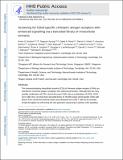| dc.contributor.author | Gordon, Khloe S | |
| dc.contributor.author | Kyung, Taeyoon | |
| dc.contributor.author | Perez, Caleb R | |
| dc.contributor.author | Holec, Patrick V | |
| dc.contributor.author | Ramos, Azucena | |
| dc.contributor.author | Zhang, Angela Q | |
| dc.contributor.author | Agarwal, Yash | |
| dc.contributor.author | Liu, Yunpeng | |
| dc.contributor.author | Koch, Catherine E | |
| dc.contributor.author | Starchenko, Alina | |
| dc.contributor.author | Joughin, Brian A | |
| dc.contributor.author | Lauffenburger, Douglas A | |
| dc.contributor.author | Irvine, Darrell J | |
| dc.contributor.author | Hemann, Michael T | |
| dc.contributor.author | Birnbaum, Michael E | |
| dc.date.accessioned | 2023-01-10T18:11:56Z | |
| dc.date.available | 2023-01-10T18:11:56Z | |
| dc.date.issued | 2022 | |
| dc.identifier.uri | https://hdl.handle.net/1721.1/147045 | |
| dc.description.abstract | The immunostimulatory intracellular domains (ICDs) of chimaeric antigen receptors (CARs) are essential for converting antigen recognition into antitumoural function. Although there are many possible combinations of ICDs, almost all current CARs rely on combinations of CD3𝛇, CD28 and 4-1BB. Here we show that a barcoded library of 700,000 unique CD19-specific CARs with diverse ICDs cloned into lentiviral vectors and transduced into Jurkat T cells can be screened at high throughput via cell sorting and next-generation sequencing to optimize CAR signalling for antitumoural functions. By using this screening approach, we identified CARs with new ICD combinations that, compared with clinically available CARs, endowed human primary T cells with comparable tumour control in mice and with improved proliferation, persistence, exhaustion and cytotoxicity after tumour rechallenge in vitro. The screening strategy can be adapted to other disease models, cell types and selection conditions, and could be used to improve adoptive cell therapies and to expand their utility to new disease indications. | en_US |
| dc.language.iso | en | |
| dc.publisher | Springer Science and Business Media LLC | en_US |
| dc.relation.isversionof | 10.1038/S41551-022-00896-0 | en_US |
| dc.rights | Creative Commons Attribution-Noncommercial-Share Alike | en_US |
| dc.rights.uri | http://creativecommons.org/licenses/by-nc-sa/4.0/ | en_US |
| dc.source | PMC | en_US |
| dc.title | Screening for CD19-specific chimaeric antigen receptors with enhanced signalling via a barcoded library of intracellular domains | en_US |
| dc.type | Article | en_US |
| dc.identifier.citation | Gordon, Khloe S, Kyung, Taeyoon, Perez, Caleb R, Holec, Patrick V, Ramos, Azucena et al. 2022. "Screening for CD19-specific chimaeric antigen receptors with enhanced signalling via a barcoded library of intracellular domains." Nature Biomedical Engineering, 6 (7). | |
| dc.contributor.department | Koch Institute for Integrative Cancer Research at MIT | |
| dc.contributor.department | Massachusetts Institute of Technology. Department of Biological Engineering | |
| dc.contributor.department | Massachusetts Institute of Technology. Department of Biology | |
| dc.contributor.department | Harvard University--MIT Division of Health Sciences and Technology | |
| dc.contributor.department | Ragon Institute of MGH, MIT and Harvard | |
| dc.relation.journal | Nature Biomedical Engineering | en_US |
| dc.eprint.version | Author's final manuscript | en_US |
| dc.type.uri | http://purl.org/eprint/type/JournalArticle | en_US |
| eprint.status | http://purl.org/eprint/status/PeerReviewed | en_US |
| dc.date.updated | 2023-01-10T17:56:30Z | |
| dspace.orderedauthors | Gordon, KS; Kyung, T; Perez, CR; Holec, PV; Ramos, A; Zhang, AQ; Agarwal, Y; Liu, Y; Koch, CE; Starchenko, A; Joughin, BA; Lauffenburger, DA; Irvine, DJ; Hemann, MT; Birnbaum, ME | en_US |
| dspace.date.submission | 2023-01-10T17:56:34Z | |
| mit.journal.volume | 6 | en_US |
| mit.journal.issue | 7 | en_US |
| mit.license | OPEN_ACCESS_POLICY | |
| mit.metadata.status | Authority Work and Publication Information Needed | en_US |
